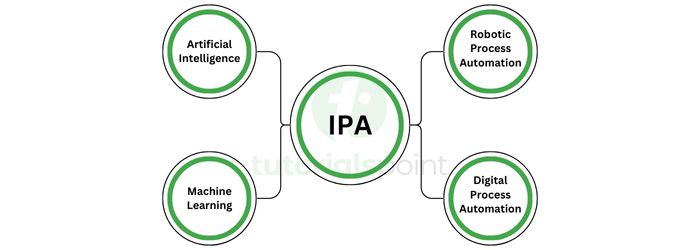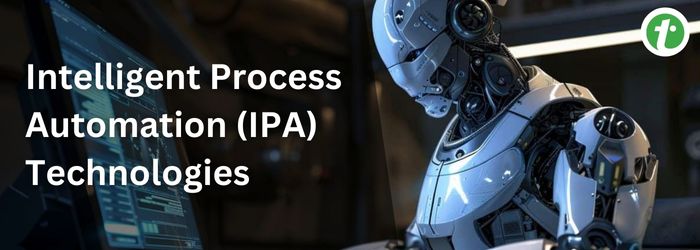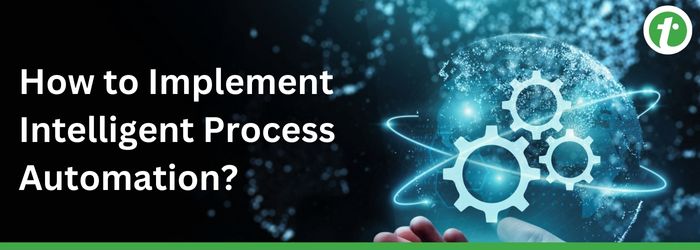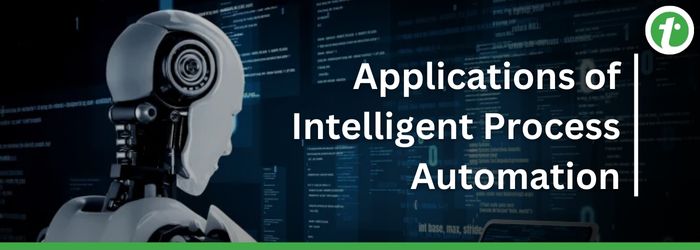
Intelligent Process Automation - Quick Guide
Intelligent Process Automation - Introduction
Intelligent Process Automation (IPA) is a modern technology used in business process automation and management to automate and streamline operations, enhance efficiency, minimize costs, and reduce manual execution of repetitive tasks. IPA basically combines robotic process automation (RPA) with cognitive technologies like artificial intelligence (AI) and machine learning (ML). Hence, IPA has capabilities to accumulate process data and learn from it to improve over time.
In this chapter, we will get familiar with the fundamentals of intelligent process automation, its key components and capabilities.
What is Intelligent Process Automation?
Intelligent Process Automation (IPA) is a business process automation technology that combines multiple advanced technologies such as artificial intelligence (AI), machine learning (ML), and digital process automation (DPA) with robotic process automation (RPA) to provide enhanced automation capabilities.
Hence, by making use of cognitive technologies, IPA can increase process performance, operational efficiency, and workflow management. IPA also reduces operational risks and creates an effective process automation environment within a business organization.
IPA is mainly designed to assist or free up human employees by automating routine, repetitive tasks and increase their productivity. Since IPA uses cognitive technologies, hence it can learn and improve from past data and experiences to perform processes more efficiently.
Due to all these advanced capabilities, business organizations use intelligent process automation (IPA) to automate most of their workflows and processes.
Components of Intelligent Process Automation
Intelligent Process Automation (IPA) uses multiple advanced technologies as its key components to provide automation of complex business processes. The main components that make up intelligent process automation are explained below −

Artificial Intelligence (AI)
AI is the most fundamental component of intelligent process automation, and it simulates human-like intelligence in digital systems. Thus, it provides cognitive decision-making capabilities to IPA systems.
As a part of intelligent process automation, AI performs the following key functions −
- Faster and accurate data analysis
- Identify patterns in process datasets
- Manage unstructured data and workflows
- Adapt to changes and optimize processes in real-time, etc.
Machine Learning (ML)
Machine learning is nothing but an AI-based technology that allows digital systems to learn from past data and experiences and improve over time without any explicit programming.
In intelligent process automation, ML acts as an important component because it allows automation systems to −
- Analyze historical data to identify patterns
- Perform predictive analytics and make more accurate decisions
- Improve efficiency and accuracy over time
- Be dynamic and adaptive, etc.
Robotic Process Automation (RPA)
Robotic process automation is a software-powered automation technology used as a component of IPA. In IPA systems, RPA is responsible for automating labor-intensive and time-consuming tasks such as data entry, invoice processing, etc. Thus, RPA provides capabilities to automate rule-based, repetitive tasks without human involvement.
Although, IPA combines RPA with AI and ML, enhancing its functional capabilities, and enables it to handle more complex processes and unstructured workflows.
Digital Process Automation (DPA)
Digital process automation is a software automation technology used to automate tasks and workflows, and optimize end-to-end processes. It provides functionalities to automate or partially-automate business processes, and enhance their efficiency and accuracy.
What is the Main Purpose of IPA?
Business organizations use intelligent process automation (IPA) as a key process automation tool with the aim to enhance their operational efficiency, process performance, reduced cost, and operational risks. The main purpose of intelligent process automation is to create an effective operations environment within a business organization.
Capabilities of Intelligent Process Automation
As IPA combines multiple advanced technologies like AI, ML, RPA, etc. Hence, it empowers business organizations with more innovative capabilities to optimize processes, streamline operations, and better decision-making.
Some of the important capabilities that intelligent process automation provides are listed below –
- It provides AI-powered, cognitive automation to assist human workers in making informed decisions and effectively completing tasks.
- IPA allows automation systems to understand human languages by using natural language processing.
- IPA allows organizations to enhance their consistency and agility in business processes.
- IPA also provides capabilities to discover processes, analyze data, and optimize business operations.
- IPA can extract data from documents and organize it into structured formats.
- IPA is also capable in processing visual digital formats like images or videos to extract information for process automation and optimization.
Importance of Intelligent Process Automation
In modern business organizations, intelligent process automation serves as an important technological tool because it allows to –
- Automate repetitive tasks and streamline operations
- Free up human workers to focus on high-value, strategic tasks
- Enhance customer support services
- Improves flexibility, etc.
Conclusion
In this chapter, we explained the basics of intelligent process automation (IPA) and its significance in business process automation and management. Let's move to the next chapter in the tutorial and learn the differences between IPA (Intelligent Process Automation) and RPA (Robotic Process Automation).
Difference between RPA and IPA
The main purpose of both RPA (Robotic Process Automation) and IPA (Intelligent Process Automation) is to automate repetitive tasks and workflows within a business organization. However, both these automation technologies are different from each other.
The fundamental difference between RPA and IPA is that RPA uses simple software robots to automate only rule-based, repetitive tasks that involve the use of structured data, whereas IPA uses cognitive technologies like artificial intelligence (AI) and machine learning (ML) along with RPA and can handle unstructured data and automate complex processes.

This chapter is meant for providing a comparative study of robotic process automation (RPA) and intelligent process automation (IPA).
Difference between RPA and IPA
The following table highlights all the significant differences between robotic process automation (RPA) and intelligent process automation (IPA) −
| Parameter | RPA | IPA |
|---|---|---|
| Definition | RPA is a software-based automation technology used in businesses to automate repetitive, rule-based, time consuming tasks and processes. | IPA is a combination of RPA, AI, ML, NLP, and many other advanced technologies designed to automate end-to-end business processes with cognitive decision-making. |
| Automation capabilities | RPA can automate only rule-based, repetitive tasks. | IPA can automate complex processes that require cognitive intelligence, decision-making, and adaptability. |
| Data handling | RPA can handle structured data only. | IPA is capable in handling both structured and unstructured data. |
| Ability to learn | RPA does not have ability to learn from historical data and past experiences. | IPA uses machine learning technology to learn from past actions. |
| Adapt to changes | RPA can operate using pre-defined instructions and cannot adapt to changes in processes. | IPA uses cognitive technologies allowing it to adapt to changes without any explicit programming. |
| Decision-making | RPA does not have decision-making capabilities, instead it follows a set of pre-defined instructions to automate tasks. | IPA uses data analytics to identify patterns and get insights to make informed decisions in real-time. |
| Implementation | RPA is easy and less time-taking to implement. | Implementation of IPA is a complex and time-consuming processes, as it involves integration of multiple technologies. |
| Benefits | RPA improves operational efficiency, reduces human errors, and frees up human workers from low-value tasks. | IPA creates a more sustainable automation ecosystem and allows for continuous learning and improvement of processes. |
| Suitability | RPA is suitable to automate simple, individual tasks. | IPA is suitable for end-to-end automate complex processes. |
| Applications | RPA is used for automating tasks like data entry, file transfer, account reconciliation, record updates, etc. | IPA is used for automating advanced processes like predictive analytics, personalized customer support, fraud detection, etc. |
Conclusion
RPA is a simple software-based automation technology used to automate rule-based, repetitive tasks that do not require decision-making. In contrast, IPA is a group of multiple advanced technologies like RPA, AI, ML, DPA, NLP, etc. designed for cognitive process automation that requires real-time decision-making.
Lets move ahead in the tutorial and learn about the core technologies used to implement intelligent process automation.
Core Technologies in Intelligent Process Automation
Intelligent Process Automation (IPA) applies numerous advanced technologies to automate and streamline business processes, enhance operational efficiency, reduce errors and costs within an organization. This chapter will provide an overview of various core IPA technologies and explain their significance in business process automation.
Intelligent Process Automation Technologies
Some of the key technologies behind the implementation and operation of intelligent process automation are explained below −

Robotic Process Automation (RPA)
RPA is a software-based automation technology that uses pre-defined sets of instructions to automate rule-based, repetitive tasks without any human involvement. RPA uses virtual robots to execute tasks, and these robots can emulate human actions in digital systems.
RPA helps businesses to free up their human employees from low-value tasks to be engaged in strategic activities. It also reduces errors, increases efficiency, and makes processes faster.
Some common examples of RPA applications in IPA include data entry, calculations, generating reports/invoices/pay slips, etc.
Artificial Intelligence (AI)
AI is a modern technology that helps to simulate human like intelligence in digital systems. In intelligence process automation, AI is used for following main purposes –
- Analyze data to identify patterns and trends
- Data-drive and cognitive decision-making
- Perform predictive analysis
- Handle unstructured data, etc.
Fraud detection, transactional verifications, identify causes of errors, etc. are common examples of AI’s application in IPA.
Machine Learning (ML)
Machine learning is an AI technology which allows digital systems to learn and improve from historical data and past experiences without needs for any external programming. In intelligent process automation, ML enables automation systems to handle complex processes, adapt to changes, and improves accuracy and efficiency over time.
A common example of application of machine learning in IPA is dynamic price adjustments in e-commerce sites, depending on demand and competition.
Business Process Automation (BPA)
Business process automation is an advanced automation approach that helps business organizations to automate their entire processes from start to finish by using advanced technologies.
As a part of IPA technologies, BPA performs the following key functions –
- Automates end-to-end business processes
- Reduces costs involved in business operations
- Enhances efficiency and consistency in processes, etc.
Natural Language Processing (NLP)
Natural language processing is also an AI technology that enables digital systems to understand and interpret human languages. In IPA, it is used in tools like chatbots, virtual assistants, etc. to automate responses to customer queries, extract data from documents, etc.
Big Data
Big data is an advanced technology used for analyzing or processing large amounts of structured, semi-structured, or unstructured data. In IPA, it integrates capabilities to analyze large process datasets to provide valuable insights for optimization of processes and workflows, and make context-driven decisions. Big data also helps to identify inefficiencies and issues in business operations.
Process Mining
Process mining is a technology that uses specialized algorithms to analyze process data to identify inefficiencies, recognize patterns, and understand how processes are actually executing. In intelligent process automation, it enables business organizations to discover and optimize their workflows.
Computer Vision
Computer visions is an advanced technology used in intelligent process automation to provide capabilities of identifying, extracting, and interpreting visual data like images and videos. In intelligent process automation, computer vision is used to automate tasks that require visual data like scanning documents for data entry.
Conclusion
In this chapter, we highlighted the functions and importance of the core technologies in intelligent process automation. Let's move forward to the next chapter and learn how intelligent process automation actually works?
Implementation of Intelligent Process Automation
IPA makes combined use of multiple advanced technologies like AI, ML, process mining, robotic process automation (RPA), etc. to automate business processes and enhance operational efficiency of an organization. Lets understand how these different technologies are combined together to streamline business operations within an organization.

In this chapter, we will explain the implementation of intelligent process automation (IPA).
How to Implement Intelligent Process Automation?
The implementation of IPA is a multi-step process that requires careful planning and integration of various technologies. The step-by-step explanation to implement intelligent process automation is described below −
Step 1: Identification and Selection of Processes
The implementation of intelligent process automation beings with identification of processes that can be automated using IPA. For this purpose, IPA tools like data analytics, process mining, etc. are used to perform process discovery. This step also involves the evaluation of return of investment for automating specific processes and assessment of their feasibility.
Step 2: Collection of Data
Data is the foundation for intelligent process automation. Once the processes for automation are identified and selected, then IPA collects sufficient relevant data from systems to train AI technologies and optimize automation.
Step 3: Designing Workflow Automation
After process selection and data collection, workflow automation designs are prepared. This step involves defining the sequence of automated actions that has to be executed to complete a process.
In this step, various important activities are performed like visually mapping the end-to-end processes, defining decision points for AI tools, highlighting points that require manual intervention, etc.
Step 4: Integration of Tools and Platforms
Next, the IPA implementation comes at the technology integration stage, where multiple automation technologies like RPA, AI, ML, process mining, BPA, cognitive agents, etc. are combined together to automate tasks, decision making, predictive analytics, document processing, and more.
Step 5: Training and Testing of IPA System
After integrating components of IPA, data is used to train the AI-powered tools of IPA to perform operations and make data-driven decision in process automation.
Once the training phase complete, the IPA system must be tested in a controlled environment to ensure its reliability and accuracy. If there are any needs for refinement, then it should be improved by using iterative feedback loops.
Step 6: Deployment in Real Environment
After assuring the reliability of IPA, it is deployed in live systems to implement process automation. It is also connected with other enterprise systems like ERP, CRM, etc.
Step 7: Continuous Monitoring and Optimization
IPA system must be continuously monitored by using dashboards to tack its performance, functionality, and errors. By collecting feedback from system performance, it should be refined and improved over time.
Conclusion
In this chapter, we highlighted a typical step-by-step framework to implement an IPA system that can operate reliably and efficiently to deliver value to a business organization. Let's go ahead in the tutorial and understand how does intelligent process automation benefits to a business organization?
Intelligent Process Automation - Advantages and Disadvantages
Intelligent Process Automation (IPA) is a method of streamlining and optimizing various business processes by using advanced technologies, such as artificial intelligence (AI), machine learning (ML), robotic process automation (RPA), computer vision, process mining, big data, and many others.
Since IPA combines multiple technologies, it offers several benefits in various industries like manufacturing, healthcare, customer support, logistics, etc. However, it also has some disadvantages that we should consider.

In this chapter, we will learn about the key Advantages and Disadvantages of intelligent process automation.
Advantages of Intelligent Process Automation
By combining multiple advanced technologies, intelligent process automation (IPA) offers numerous benefits in various industries. Some of the key benefits of IPA are explained below.
Increased Operational Efficiency
Intelligent process automation enhances the operational efficiency in business processes by −
- Automating repetitive, rule-based tasks as well as complex processes
- Optimizing workflows
- Freeing up human employees to be engaged in strategic tasks
- Reducing manual errors and speed up the processes
Reduced Costs
Intelligent process automation reduces the dependency on human workers for completing repetitive tasks. Hence, it also reduces operational costs involved in processes by –
- Reducing human errors and rework requirements
- Minimizing inefficiencies in processes
- Scaling business operations, etc.
Improved Customer Experiences
Intelligent process automation also enhances customer satisfaction and experiences by –
- Improving service delivery
- Increasing speed and quality of service
- Resolving customer queries 24/7
- Responding in real-time, etc.
Enhanced Decision-Making
Intelligent process automation makes use of cognitive technologies like artificial intelligence and machine learning for getting insights from data analysis and learning from experiences for making more informed decisions in process automation. It also allows to adapt to changes in processes.
Improved Employee Productivity
Intelligent process automation can automate all the low-value, time-consuming, and repetitive processes, and frees up employees from them. Now, the employees can be engaged in strategic, creative, and higher-value tasks, which improves their productivity and job satisfaction.
Disadvantages of Intelligent Process Automation
Intelligent process automation offers several benefits as discussed above; however, it also has certain disadvantages. Some of the key disadvantages of IPA are explained here –
High Initial Cost
Intelligent process automation requires a very high initial investment for implementation. These costs are mainly involved in infrastructure development, purchasing automation tools and software, training employees on new technologies.
Implementation Complexity and Challenges
Implementation of intelligent process automation requires comprehensive knowledge of business processes, integration and coordination of IPA tools with existing systems, etc. All this makes IPA implementation a complex, challenges, and time-consuming process.
Dependence on Data Quality
The operation of intelligent process automation is completely dependent on quality of data which is used for training the cognitive automation technologies. An incomplete or poor-quality data can cause incorrect decision-making and inaccurate process automation.
Job Displacement
Intelligent process automation can also cause job displacement in many industries, mainly those involving low-value and repetitive tasks.
Requirement of Maintenance and Updates
Intelligent process automation requires regular maintenance to perform tasks accurately and reliably. Also, IPA software and algorithms must be kept updated to remain effective in dynamic business environment.
Vulnerable to Cybersecurity Threats
Intelligent process automation uses sensitive data of a business organization for automating and optimizing workflows and processes. Hence, it can be vulnerable to cybersecurity threats or attacks if not provide proper security layers. This risk becomes more probable when the IPA system uses cloud-based tools and platforms.
Conclusion
In this chapter, we provided a detailed overview of the benefits of IPA and its main drawbacks. Let's move forward to next chapter in the tutorial and get an overview of major challenges in IPA implementation.
Challenges of Intelligent Process Automation
Intelligent Process Automation (IPA) provides ways for automating processes and improving operational efficiencies. For this purpose, IPA makes combined use of advanced technologies like artificial intelligence (AI), machine learning (ML), robotic process automation (RPA), process mining, big data analytics, and many others.
Despite its advantages like improved efficiency, reduced costs, minimized errors, streamlined operations, etc., the implementation of IPA is a challenging task.

This chapter explains some of the key challenges that businesses face while implementing intelligent process automation.
Challenges in IPA Implementation
The major challenges faced in implementing intelligent process automation are explained below –
Fragmented Business Processes
It is one of the major challenges in IPA implementation. Many business organizations do not have standardized workflows or processes, and they remain poorly defined or fragmented. Then, it is very difficult to apply IPA and automate such processes. Also, the business processes are fragmented, then their automation can increase inefficiencies rather than eliminating them.
Data Quality Challenges
As we know, intelligent process automation depends on data to operate effectively and reliably. If the data used to train IPA tools is of poor quality like incomplete, unstructured, or inconsistent, then it can result in inaccurate outcomes or inefficient IPA operation. These challenges increase the time and costs required for IPA implementation.
Complex to Integrate with Legacy Systems
Business organizations have their own old legacy systems which are not compatible with intelligent process automation technologies. Therefore, implementing IPA by bridging the gap between existing systems and new IPA tools becomes a challenging, complex, and time-consuming process.
Needs for IT Infrastructure and Expertise
A robust IT infrastructure and technical expertise are required to implement a successful IPA system in a business organization. This is because, IPA involves the interconnected use of multiple advanced technologies and data communication. But most business organization do not have a reliable IT infrastructure for IPA, which causes difficulties and delay in IPA implementation.
Resistance to Change from Employees
Most employees of a business organization see intelligent process automation as a threat to their jobs. This fear of job displacement can lead to resistance to change in workflows from employees and slow down the process of IPA implementation.
Right Process Selection
It is also a challenging task for identifying and selecting right processes for automation using IPA to maximum business growth and ROI. If wrong processes are automated, then it may cause wastage of resources and efforts.
Solutions to Address Challenges of IPA
The following practical approaches can organizations use to overcome above concerns and challenges of intelligent process automation −
- Organizations can perform an in-depth analysis of their processes and workflows before implementing intelligent process automation.
- Using systems that are easily scalable and adaptable and modernizing existing legacy systems where needed.
- Educating employees about benefits of IPA and providing trainings to use IPA for improving their productivity.
- Selecting processes of higher priority and impact for automation, so they can result in maximum ROI.
Conclusion
This chapter highlighted some of the major challenges of IPA and the best practices to address those challenges. Let’s go ahead in the tutorial and learn the practical use cases of intelligent process automation.
Applications of Intelligent Process Automation
Intelligent Process Automation (IPA) is transforming the businesses by making combined use of technologies like robotic process automation (RPA), artificial intelligence (AI), machine learning (ML), process mining, and natural language processing (NLP). Business organizations use IPA to automate and optimize their processes and workflows, and enhance efficiency in their operations.

In this chapter, we will learn about some common examples of IPA applications and use cases.
Intelligent Process Automation Use Cases
In this section, we will highlight some of the major areas where intelligent process automation is used in businesses −
Automating Financial Processes
Businesses use IPA to automate their financial processes and operations like generating, validating, or approving invoices, making or scheduling payments, extracting data from invoices, etc. The use of IPA for automation of financial processes results in several advantages such as reduced errors, faster data entry, enhance compliance, etc.
Customer Onboarding
Industries like banking, insurance, retail, etc. use intelligent process automation to automate their customer onboarding process and improve customer experiences. In customer onboarding, IPA can automate processes like document uploads and verification, background checks, identity recognition, etc.
Automated customer onboarding results in benefits like faster onboarding process, enhanced customer satisfaction, reduced workload on employees, etc.
Fraud Detection
Intelligent process automation is also used to detect frauds and identify suspicious activities. Because of this capability, IPA is widely used in industries like banking, insurance, online payment systems, and e-commerce.
IPA uses artificial intelligence (AI) to analyze transaction data and patterns to determine inconsistencies in real-time. This use case of IPA offers several benefits such as early detection and prevention of frauds, fulfil compliance requirements, etc.
Automating Insurance Claims Processing
In insurance sector, IPA is used to automate and streamline end-to-end claim processes. For this automated claim processing, IPA can extract data from claim forms, validate it against policy regulations, and make an appropriate decision to approve or reject the claim.
This use case of IPA helps insurance institutions to faster settle the claims, reduce operational costs, and improve customer satisfaction.
Automating Recruitment Process
In HR department, Intelligent Process Automation can be used to automate and optimize hiring process and employee management. IPA can automate various HR operations like resume screening, scheduling interviews, employee data updating, verifying documents, etc.
Using IPA for HR and recruitment automation offers numerous advantages such as quick talent acquisition, reduced administrative workload on employees, improved hiring experiences, etc.
Automating and Optimizing Supply Chains
In supply chain management, IPA is used to automate operations like inventory management, predicting demand, procurement, scheduling shipments, etc. This helps organizations to reduce disturbances in supply chain, inventory costs, and enhance collaboration with vendors.
Automating Customer Support
Business organizations also use IPA to automate and improve their customer support services by taking the advantage of IPA's chatbots or virtual assistants. IPA can automate responses to customer queries, resolve technical issues, or provide personalized recommendations. This application of IPA offers several benefits to business organizations such as speed up responses to customer's questions, free up human resources, and reduces operational costs.
Conclusion
These days, most modern businesses are using intelligent process automation to automate their processes and enhance the operational efficiency in their organizations. IPA basically transforms and revolutionizes the business operations by integrating multiple cognitive technologies.